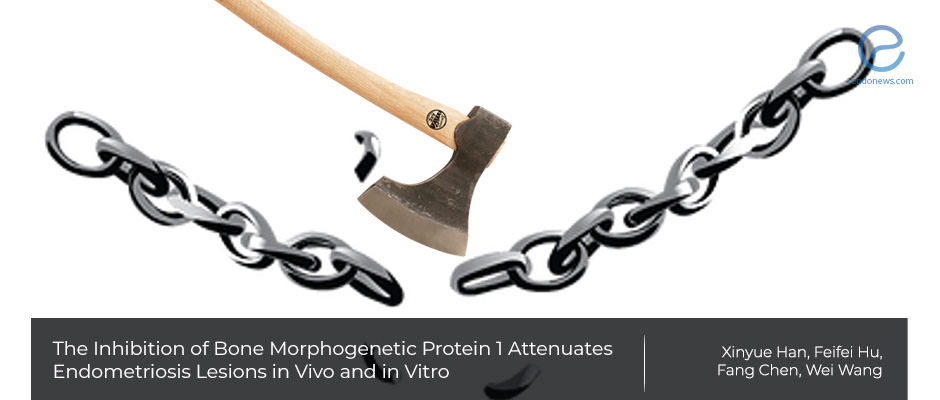Bone morphogenetic protein and endometriosis
Jul 7, 2020
Role of BMP-1 in the pathogenesis of endometriosis
Key Points
Highlights:
- Bone morphogenetic protein (BMP)-1 is involved in the pathogenesis of endometriosis.
Importance:
- The inhibition of BMP-1 attenuates inflammation of endometriosis in mice, and endometriosis cells in vitro, by the TGF-β/PI3K/Akt signaling pathway.
- BMP1 may be a potential target for the treatment of endometriosis.
What’s done here?
- On an established endometriosis model in mice, the role of BMP1-3 expression on endometriosis was investigated.
- Effect of BMP-1 treatment on the expression levels of MMP2, MMP9, TGF-β, IL-17, IL-1β, Collagen1a1, and 1a2 was evaluated.
- Endometriotic lesions and their volumes in mice were also recorded.
Key results:
- Endometriosis lesions in mice have elevated expression of BMP1-3.
- Treatment with anti-BMP1 antibodies reduces MMP2, MMP9, TGF-β, IL-17, IL-1β, Collagen1a1, and 1a2 levels in mice in a dose-dependent manner.
- TGF-β/PI3K/Akt signaling pathway was suppressed with the treatment of anti-BMP1 antibodies.
Limitations of the study:
- BMP-1 might interact with proteins and pathways other than the ones investigated in this study. Thus, additional work on all the signaling proteins should be studied.
- BMP-1 levels were not investigated after the inhibition; it is not clear if there was any redundancy left in the BMP-1 function.
Lay Summary
Endometriosis is a chronic disease characterized by the presence of endometrial glands and stroma outside the uterus, associated with several discomforts such as pelvic pain, menstrual disorders, and infertility.
Although endometriosis is categorized as a benign lesion, the ectopic endometrial tissue has significant invasion and proliferation characteristics. Indeed, endometriosis has some biological features similar to malignant tumors causing adverse effects on the patient’s quality of life.
Expression of bone morphogenetic protein 1 (BMP1), a metalloprotease, and has osteoinductive activity, having a role starting from early embryonic development.
TGF-β1, secreted as large latent complexes without activity, has important roles in the regulation of a variety of biological functions including cell differentiation, immune response, tissue repair, and extracellular matrix formation. TGF-β1 upregulation is correlated with increased expression of BMP-1, suggesting a coordinated regulation. BMP1 was reported to control TGF-β1 activation via cleavage of latent TGF-β-binding protein.
In this study, published in the "Archives of Gynecology and Obstetrics", the group led by Dr.Wang, hypothesized that the inhibition of BMP1 is also involved in the pathogenesis of endometriosis. They established a mouse model for endometriosis and showed that those lesions have elevated expression of BMP1.
Furthermore, treatment with anti-BMP1 antibodies reduced MMP2, MMP9, TGF-β, IL-17, IL-1β, Collagen 1a1, and 1a2 levels in mice in a dose-dependent manner. Finally, TGF-β/PI3K/Akt signaling pathway was also suppressed with the treatment of anti-BMP1 antibodies.
Although the study has some limitations and further experiments are required to provide stronger evidence for their hypothesis, the authors concluded that BMP1 might be a promising target for the treatment of endometriosis.
Research Source: https://pubmed.ncbi.nlm.nih.gov/32524385/
Endometriosis BMP1 PI3K Akt metalloprotease treatment

